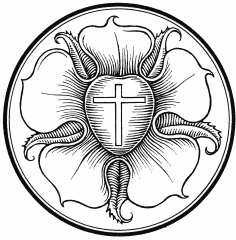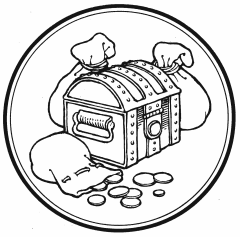 Grace, mercy, and peace to you from God our Father, and from our Lord and Savior, Jesus Christ, amen. The text for the sermon today is the Epistle, which was read earlier.
Grace, mercy, and peace to you from God our Father, and from our Lord and Savior, Jesus Christ, amen. The text for the sermon today is the Epistle, which was read earlier.
On the eve of All Saints’ Day, October 31, 1517, Martin Luther posted the 95 Theses on the door of the Castle Church of Wittenberg. His purpose behind this wasn’t to start a new church named after him. The whole purpose behind the 95 Theses was to reform the Church and restore it to the teachings of the Scriptures. His sole purpose was to have the Church teach from the Scriptures and from the Scriptures alone.
As Paul begins this portion of his letter to the Romans, he addresses it to all of the Church. He is writing it to himself, the teachers of Christ and all of Christendom. As Paul speaks of the Law, he speaks of the purpose of it: to bring us to the full realization of our sin and the saving work of Jesus Christ. The Law speaks for everyone, not just the Jew but also the Gentile, the slave and the free. The Law makes us accountable to God. It points out our sin and our utter dependence upon the work of Christ and not that of ourselves.
Paul moves on to a very important point regarding the Law when he continues, “For by works of the law no human being will be justified in his sight….” For Luther, this was one of the striking teachings of the Church that was contrary to the Scriptures. The Church taught on account of the work of Jesus plus the good works that a person does, they will inherit eternal life, following time in purgatory, of course. Most people think that good people go to heaven or that being good will get you into heaven. If there is such a place called heaven, then we’ll all be there because we’re pretty good people. We’re not perfect, but we’re not horrible either. God doesn’t require us to be pretty good people. God requires us to be perfect people. This is what Luther was trying to attain in one way or another. He sought to confess all of his sins. He tried to do all that was required by the Law in order to be saved. In the end, Luther couldn’t be perfect. He couldn’t be pretty good. He realized exactly who he was: a sinner in need of Christ’s forgiveness. It would be on account of Christ and His work that would save Luther, nothing that Luther could do himself. The same holds true for you and me as well. Nothing that we can do will make us any holier in the eyes of God. Nothing that we can do will earn us one ounce of salvation.
Paul reveals a truth that many do not want to hear and most certainly do not want to acknowledge: “For all have sinned and fall short of the glory of God….” We have missed the mark. God shows no favoritism in dealing with sinners. Those who are disobedient, that is, all of mankind, are under His wrath. Everyone receives the same punishment for their sins: death. No matter how you try to get around the issue, you are a sinner and you deserve nothing but death for your sins.
Praise be to God that Paul doesn’t leave us with the heavy-handedness of God’s wrath. What a miserable existence we would have if we were left solely to God’s wrath and judgment. Paul goes on to tell us that we “are justified by his grace as a gift, through the redemption that is in Christ Jesus….” You have your salvation by God’s gift to you that comes in the form of His Son, Jesus Christ.
As we celebrate the festival of the Reformation today, we are reminded of what was at stake during this time. What was at stake was God’s Word. What was at stake was the salvation of the people. The Church at the time of Luther taught God’s Word plus the teaching of man. It was the teaching of man that worked against the Word. Man’s teaching tainted God’s Word. Man’s teaching confused God’s Word. Man’s teaching changed God’s Word. Man’s teaching contradicted God’s Word. If there is anyone who should be adhering to God’s Word, it should be the Church. Unfortunately, this was the one place where it was not.
As Paul teaches here in Romans, “For we hold that one is justified by faith apart from works of the law,” the Church taught that your salvation was found in the works of Christ and the good works that you do as well. Your salvation was found in the indulgences that you bought that would earn you time out of purgatory.
Only one could be right: God’s Word or the word man. That’s what the Reformation was about – a return to God’s Word as the authority for our faith. Everything that we have has been given to us. We have been granted salvation because of Christ. We have been declared righteous because of Christ. We have been ransomed and the ransom price was Christ’s blood shed for us. This is how God declares us to be not guilty, by the blood of Jesus and not by our works.
When Luther wanted to know what the true means of salvation was, he kept going back to the Scriptures, namely Ephesians 2:8-9 which said, “For by grace you have been saved through faith. And this is not your own doing; it is the gift of God, not a result of works, so that no one may boast.” It is God who declares a sinner not guilty of sin. Free of sin, guilt, and punishment, the acquitted can enter the joys of heaven. This is a result of Christ and Christ alone. It is not the result of any works that we do, good, bad, or otherwise. Luther went back to the Scriptures and found that the answer to our salvation was singular and not plural. The answer was Christ. The answer is Christ. The answer will always be Christ. It is the righteousness of God through faith in Christ Jesus that saves and not the works that a person does or does not do.
There is nothing that any of us can do to gain heaven. Salvation is entirely a gift of God. A gift is something freely given, which the giver expects no payment in return. The Roman Catholic Church wanted to put a price tag on that salvation by indulgences and works. As we read the Scriptures, there is only one price tag for our salvation and that is the blood of Christ. It is the price that was to be paid for a gift that was to be freely given.
When one hears the teaching of the Church at Luther’s time, how could one accept it? How could you accept that God sent His very Son to take on human form, to live a sinless life, to die for your sinful life so that you may receive forgiveness of sins, life, and salvation, BUT in order to receive all of this, YOU have to do something to earn it! That is not a gift! That is something that which you earn yourself. That’s not what the Scriptures teach. Unfortunately, that thinking is still well and live within Christendom today.
Salvation, by grace alone, through faith in Jesus Christ alone, as found in Scripture alone, is the basis of our daily Christian life because that is what the Word of God teaches. The Reformation and the work of Luther was nothing more than opening the eyes of God’s people to His holy Word so we may see that this wonderful gift of faith is ours, not because of what you and I do, but it is ours solely because of what our Lord and Savior Jesus Christ has done for us. In the name of Jesus, amen. Now the peace of God that passes all understanding, keep your hearts and minds through faith in Christ Jesus, amen.


